Letter to Our Partners and Stakeholders
Dear Partners and Stakeholders,
As I reflect on the previous year, I am proud of the continued progress and partnerships that have propelled UL Standards & Engagement (ULSE) forward in its mission to enhance public safety worldwide. Building on over a century of innovation since the publication of our first standard, ULSE remains steadfast in our commitment to translating scientific discoveries into actionable standards and impactful policies that prioritizes public safety.
Electrification continued to be a cornerstone of our work in 2024, as we supported economies’ transition to renewable energy, electric vehicles and battery energy storage systems. By developing standards that address the safety risks of electrification applications and promote trust in innovation, we strive to enable economies to meet their net-zero ambitions while ensuring that a safe and sustainable energy future can be safeguarded. At the same time, our legacy of leadership in fire safety endures. We remain dedicated to maintaining and enhancing our comprehensive suite of fire safety standards, and to providing technical support to help our partners enhance fire safety across diverse contexts and needs.
This past year, ULSE was honored to participate in the 29th United Nations Climate Change Conference, or COP29, as a sponsor of a collaborative pavilion with the International Electrotechnical Commission (IEC) and the International Organization for Standardization (ISO). The pavilion served as a dynamic platform for fostering global dialogue on safety, sustainability, and innovation. We showcased how standards can play an enabling role in addressing climate challenges, driving electrification, and supporting a just transition to a net-zero future. Our presence at COP29 highlighted the importance of collaboration and knowledge-sharing – particularly with international standards organizations, so that meaningful, systemic impact can be created.
As part of continued efforts to stakeholder engagement, ULSE was proud to recognize INTECO – the National Standards Body of Costa Rica – with our first-ever Global Impact Stakeholder Award. This recognition celebrates INTECO’s outstanding commitment to international collaboration and their contribution to advancing the ULSE mission. By spotlighting their dedication, we hope to inspire more partners around the world to actively participate in our standards development process, and help shape a safer, more sustainable future.
At the same time, we continue to deepen our partnerships with current in-market partners and experts, shaping conversations and action around safety science at the local levels. We remain deeply committed to supporting regulators, policymakers, industry game changers, and stakeholders in addressing your safety challenges.
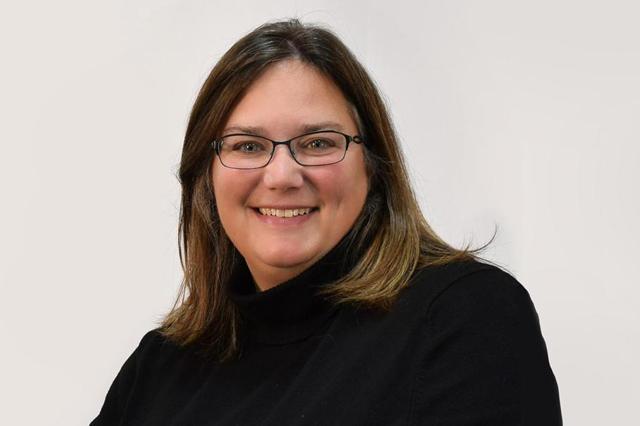
To all our partners and stakeholders, my appreciation for your dedication and valuable contributions to advancing the UL mission. Your efforts enable us to make an impact, and I look forward to our continued success as we build on the momentum of 2024. Together, we will achieve even greater progress in the year ahead.
Sonya M. Bird
Vice President, International Standards
Electrification
As global demand for batteries continues to grow, driven by the expanding adoption of clean energy technologies, both opportunities and challenges are increasing rapidly. Lithium-ion batteries are essential for powering the rising number of electric vehicles, storing electricity for power grids, and capturing renewable energy from solar and wind sources. Equally critical is the development of innovative circular economy solutions to manage end-of-life processes and minimize e-waste. However, if these batteries are damaged, improperly manufactured, counterfeit, or substandard, there is higher risk of entering a hazardous state of thermal runaway—an uncontrollable self-heating reaction that may result in smoke, fire, toxic gas emissions, or explosions. Products independently certified to ULSE standards help provide assurance that known hazards and risks in battery products and applications have been considered and addressed.
In 2024, we intensified our international efforts to advance global safety by cultivating greater awareness of these risks and reinforcing our commitment to a safer, electrified future.
Electrification Standards for Key Product Categories
ULSE’s electrification portfolio includes standards for a wide variety of battery-powered products and systems. The following highlighted electrification categories generate high interest among global stakeholders due to their impact on clean energy and sustainability.
- UL 2202, DC Charging Equipment for Electric Vehicles
- UL 2251, Plugs, Receptacles, and Couplers for Electric Vehicles
- UL 2271, Batteries destinées aux véhicules électriques légers (LEV)
- UL 2272, Electrical Systems for Personal E-Mobility Devices
- UL 2278, Outline of Investigation for Megawatt Charging Configured Electric Vehicle Couplers
- UL 2580, Batteries for Use in Electric Vehicles
- UL 2594, Electric Vehicle Supply Equipment
- UL 2849, Electrical System for E-Bikes
- UL 2850, Outline of Investigation for Electric Scooters and Motors
- UL 3202, Outline of Investigation for Mobile Electric Vehicle Charging Systems Integrated with Energy Storage Systems
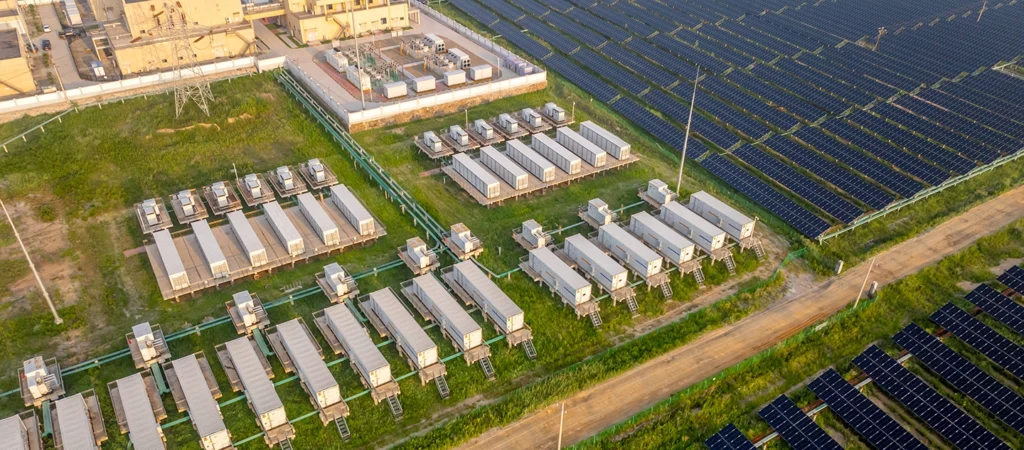
- UL 1973, Batteries for Use in Stationary and Motive Auxiliary Power Applications
- UL 1974, Evaluation for Repurposing and Remanufacturing Batteries
- UL 9540, Energy Storage Systems and Equipment
- UL 9540A, Test Method for Evaluating Thermal Runaway Fire Propagation in Battery Energy Storage Systems
By Region
Learn more about our electrification efforts by region.
Inde
Throughout the year, we hosted several initiatives to advance conversations and stakeholder action plans on mitigating the safety risks of electrification applications. As part of the three-year “Building Robust EV Safety Ecosystem in India” program between ULSE and the U.S. Commercial Services, a roundtable brought together over 30 key Indian stakeholders – from policymakers and government officials to think-tanks and academia – to enhance the safety reputation of India’s burgeoning EV ecosystem and propel the sector forward. Key solutions included enhancing safety communications, revision of the national grid code to identify standards gaps, skills development of professionals in the sector, and implementing data traceability measures to combat the spread of counterfeit ‘unsafe’ products.
Other electrification-related events hosted in collaboration with key partners included webinars relating to lithium-ion battery standards for use in EVs and for energy storage systems. These events included presentations from experts representing government and industry, as well as UL Solutions. Discussion topics spanned battery usage, thermal runaway management and mitigation, battery chemistry, climate conditions triggering battery fires, battery design for ESS and EVs in accordance with international standards, and compliance challenges with battery codes and standards. We also participated in events such as India Smart Utility Week, India Energy Storage Week and the Society of Indian Automobile Manufacturers (SIAM)-Global Electrification Mobility Summit, hosted by key partners such as Bureau of Indian Standards (BIS), Ministry of New and Renewable Energy (MNRE), Delhi Research Implementation and Innovation Venture (DRIIV), and India Energy Storage Alliance (IESA). Later in the year, we worked to support the distributed energy resources (DER) sector with a virtual roundtable promoting UL 1741, Standard for Inverters, Converters, Controllers and Interconnection System Equipment for Use with Distributed Energy Resources and to advance discussion about safety requirements to address in Indian regulations for integrating DER.
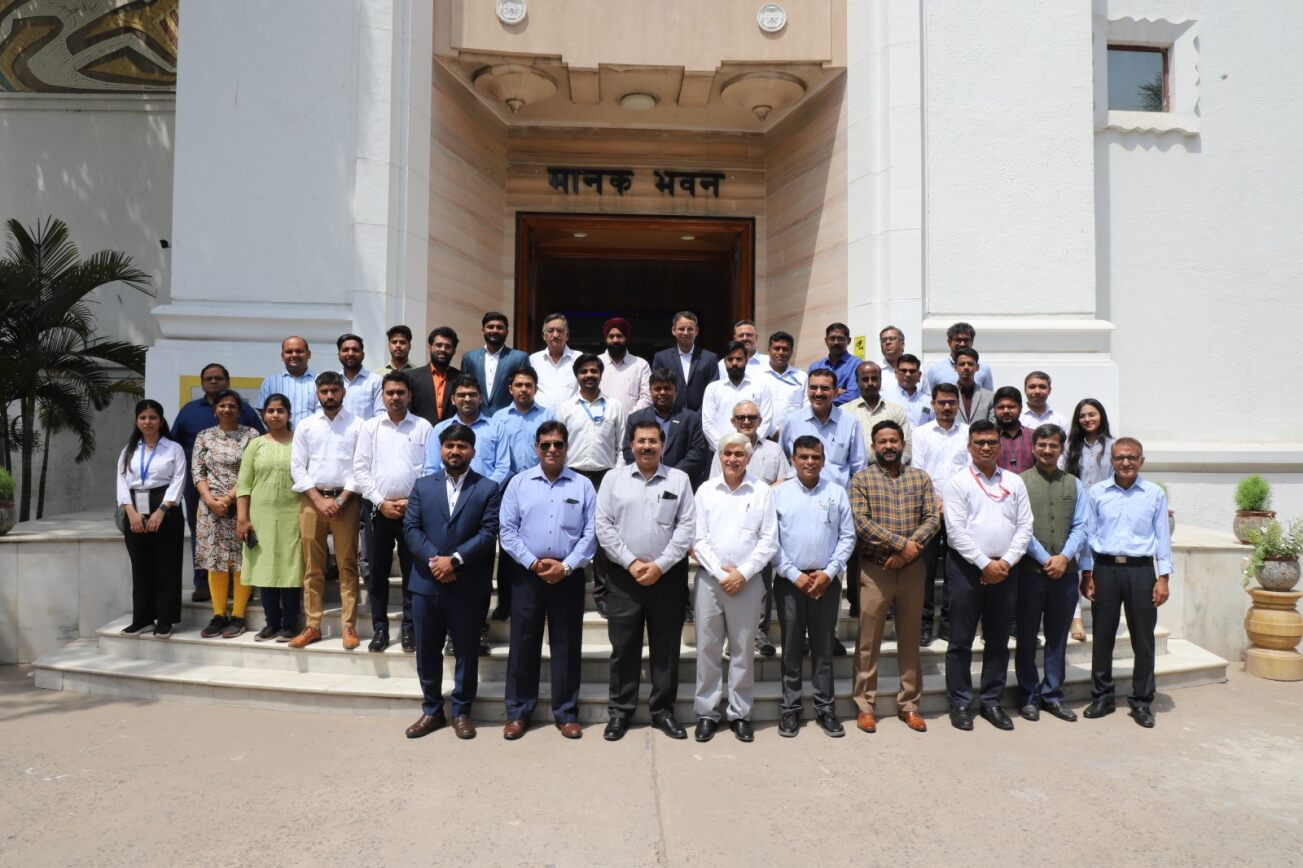
Singapour
In April, we partnered with the Singapore Battery Consortium (SBC) and other local stakeholders to organize a weeklong series of battery-related activities. We were joined by Adam Barowy, Lead Research Engineer for UL Research Institutes’ Fire Safety team, and Sean DeCrane of the International Association of Fire Fighters (IAFF),. Roundtable events included participation by the Institute of Fire Engineers Singapore (IFES), Enterprise Singapore, and the Agency for Science Technology and Research (A*STAR). Attendees learned from these organizations’ experiences and insights conducting electrification research – particularly on electric vehicles. Adam and Sean were special guests at a Singapore Basement Energy Storage System Working Group meeting, chaired and hosted by the Singapore Civil Defence Force (SCDF). They provided inputs on the inclusion of several clauses referencing UL 9540A, Test Method for Evaluating Thermal Runaway Fire Propagation in Battery Energy Storage Systems, in the Singapore Fire Code. The week’s activities culminated in the Singapore Battery Safety and Innovation Workshop, jointly organized by ULSE, the SBC, and the Singapore Prime Minister’s Office – Science and Technology Policy and Plans Office. The conference drew more than 300 regional and local attendees from battery-related industries, government and academia domains, many of whom have vested interests in the battery economy or have stakes in battery research and innovation development. Among the attendees were senior-ranked officials from the national fire bureaus of the Philippines, Indonesia, Vietnam and Singapore. The showcased the various tenets and initiatives of the battery value-chain – from fire safety research and fire management tactics to testing and standards development – as viable solutions to address safety concerns and reduce barriers to the advancement of battery technology and utilization.
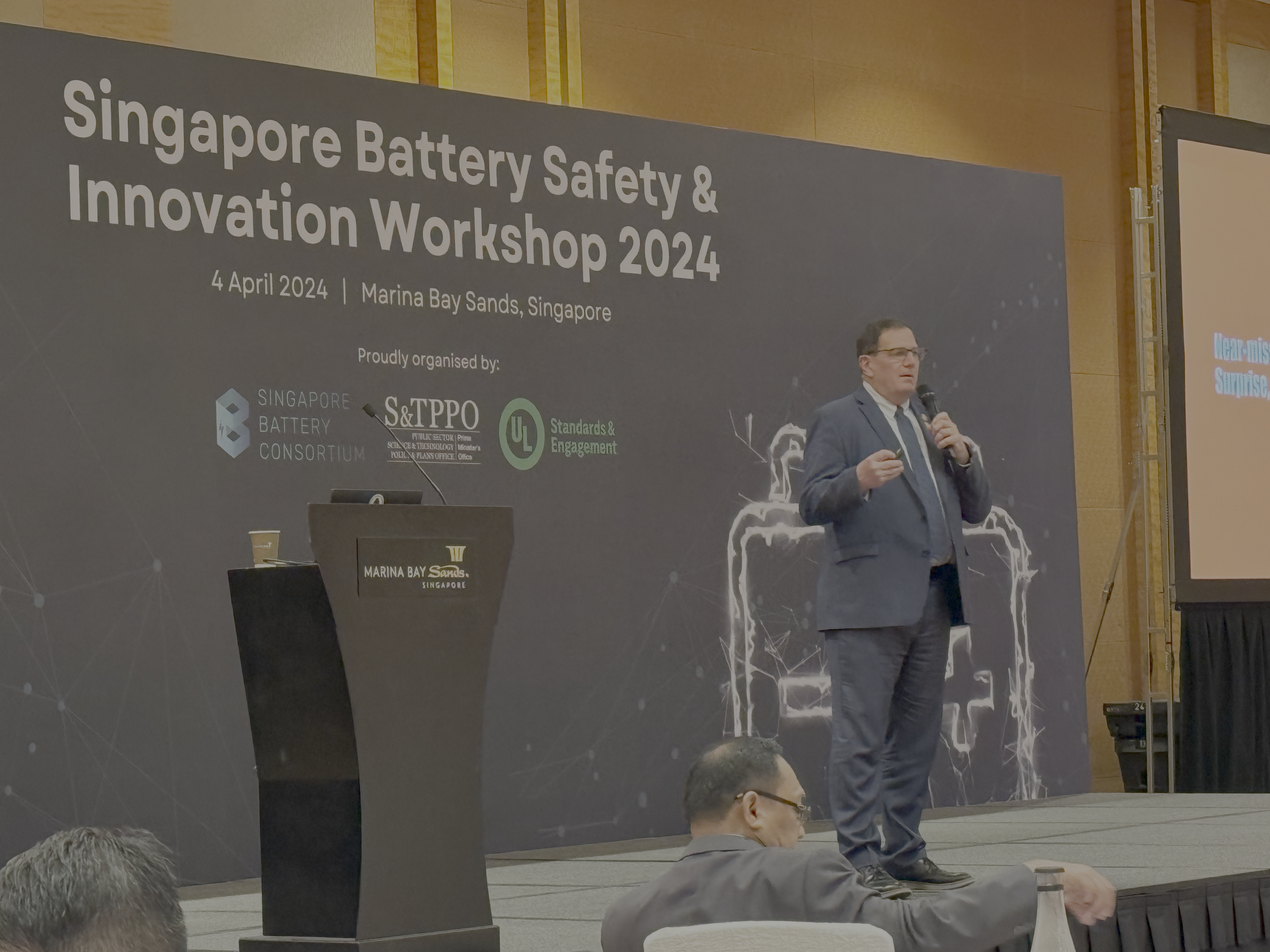
During the second half of the year, ULSE organized the UL 9540A Train-the-Trainer program; the timing of which was coordinated with the September release of the amended Singapore Fire Code. The amendments included new clauses for basement applications of ESS, several of which reference UL 9540A tests that deviated from local norms. Training seminars facilitated by experts from UL Solutions provided an expansive review of the standard’s technical requirements and other details aligned with the new regulations to support the safe deployment of ESS in unconventional environments, such as basements.
Vietnam
The centerpiece of our engagement with Vietnam relating to electrification was facilitating the national adoption of UL 1973, Batteries for Use in Stationary and Motive Auxiliary Power Applications, and UL 1974, Evaluation for Repurposing or Remanufacturing Batteries. In partnership with the Commission for Standards, Metrology and Quality (STAMEQ), a series of roundtables were arranged to facilitate discussion between UL enterprise experts and the national technical committee on batteries about proposed technical clarifications.
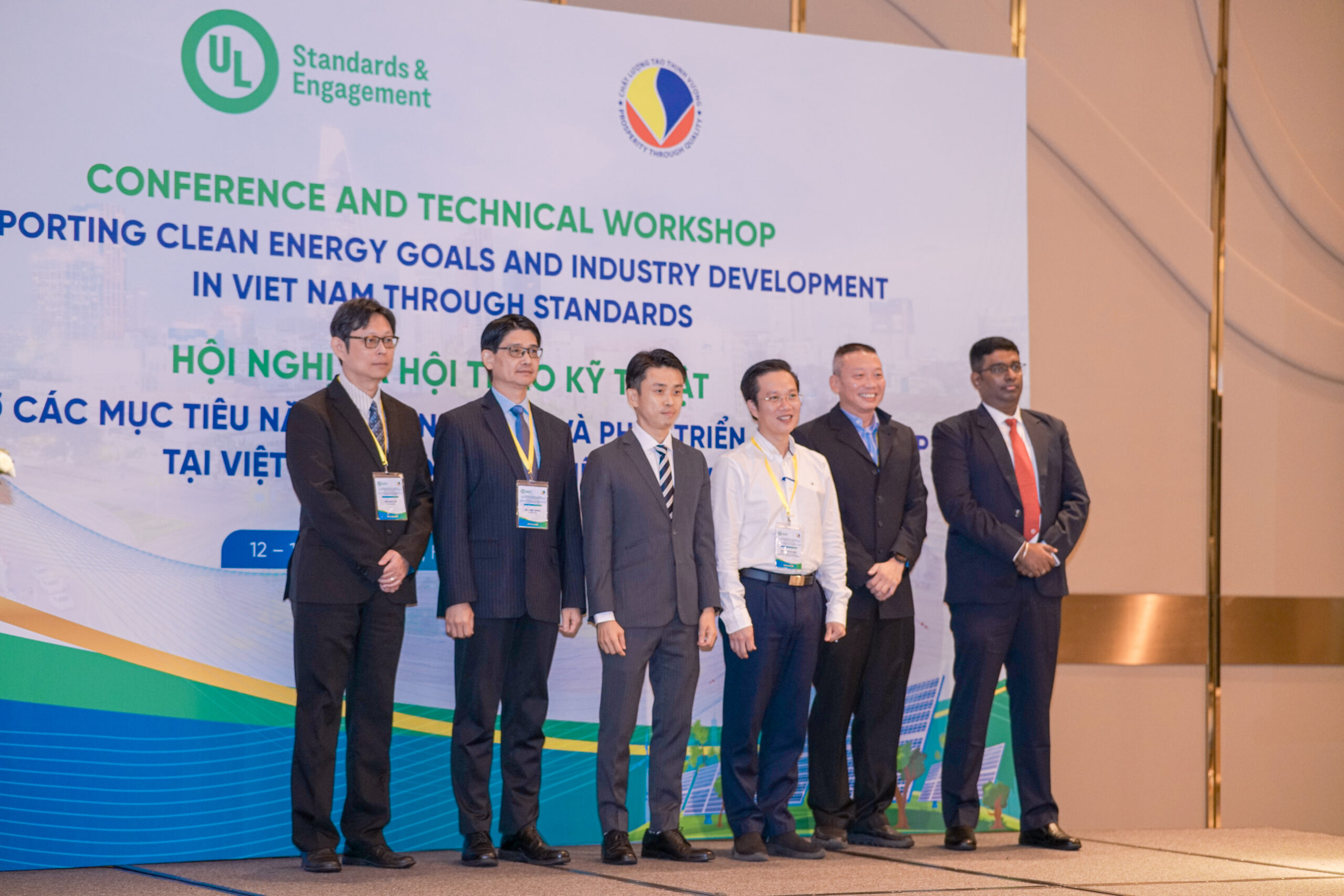
In August, our annual conference series was held in Ho Chih Minh City, where many manufacturers are based, to facilitate their participation given their high interest in and utilization of international standards. The conference built upon the previous event held in 2023 with a new segment on fire safety. Approximately 100 attendees discussed the fire safety challenges for clean energy industrial applications and how standards can address such challenges. Attendees included representatives from STAMEQ, VinFast, state-owned enterprises, and academia. The conference’s timing was coordinated with Secutech Vietnam, a signature trade fair hosted yearly by our partner, the Vietnam Police Department of Fire & Rescue (PDFR), to support this key national body’s signature event and our participation as a speaker at their internal seminar.
Philippines
In September, ULSE jointly organized a conference in Manila with the Bureau of Philippine Standards to analyze a series of domestic fire incidents caused by substandard photovoltaic systems. Promoting Standards in Photovoltaic and Energy Storage System to Enhance Safety and Fire Protection featured presentations advancing awareness about ULSE standards for ESS and other battery safety topics to help address some of the root causes of the fires. Speakers included experts from UL Solutions, Singaporean ESS expert Dr. Lionel Moh, and representatives of Philippine industry and government – including Dr. Florigo Varona, the 2024 President of the Institute of Integrated Electrical Engineer (IIEE), and officials from the Bureau of Fire Protection and the Department of Energy, who spoke in support of renewable energy development in the country.
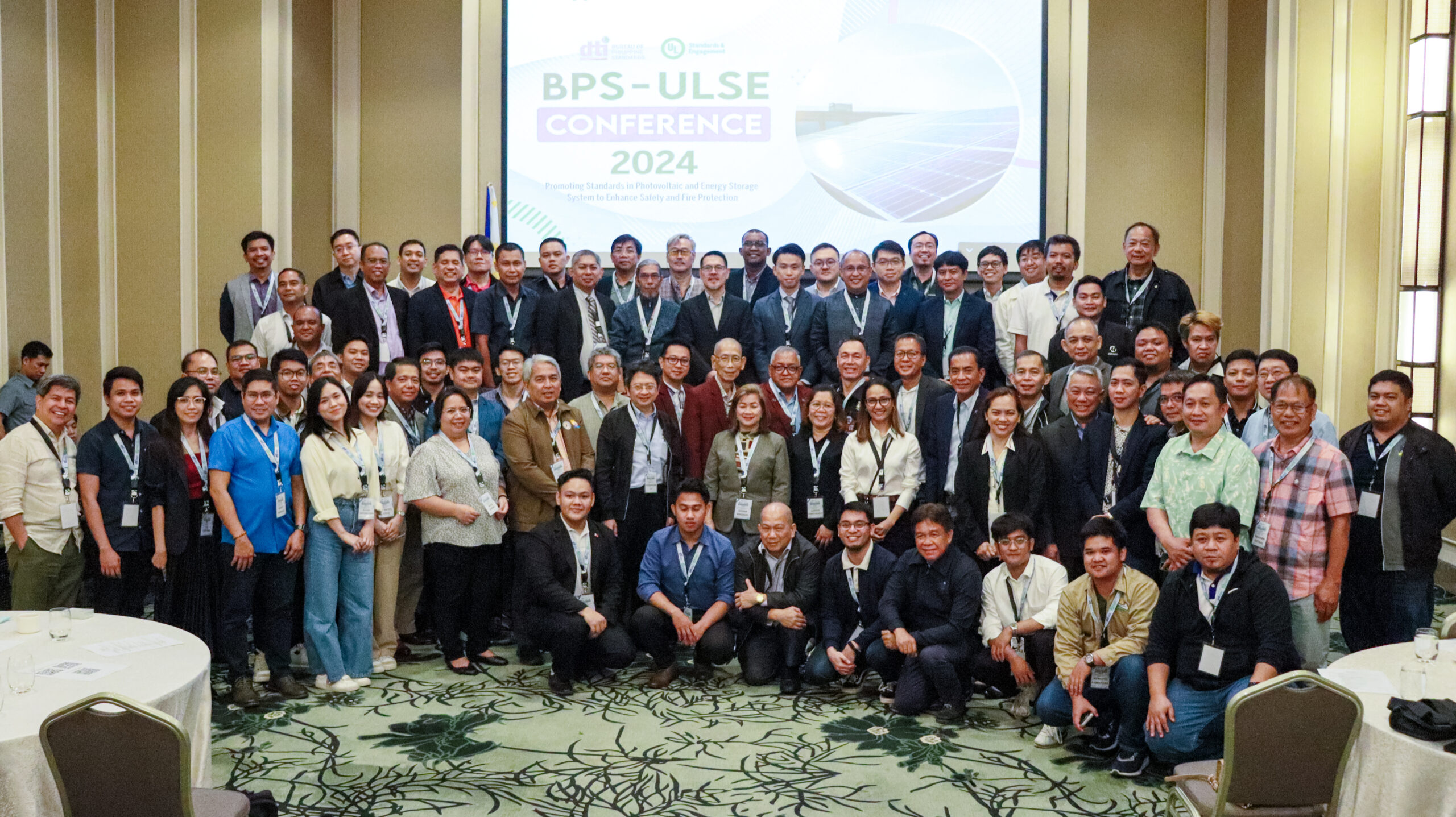
Other Events and Initiatives in ASEAN
We built upon existing relationships with additional national standards bodies in the region through hosting a variety of events, as well as participation in events hosted by these partners. This included multiple presentations in Indonesia by Regional Director Kolin Low about ULSE’s portfolio of standards for battery and fire safety, including at the International Battery Summit.
We were proud to co-host the first Thai Standards Forum with the Thai Industrial Standards Institute (TISI). The Forum explored various trends, issues, and regulatory gaps related to battery safety. ULSE Data Science Manager Ben Rodrawangpai joined Dr. Carl Wang and Winter Ho represented the UL enterprise as speakers. In his presentation, Rodrawangpai discussed lithium-ion battery safety along with the analytical and visualization methods ULSE uses to study these and other issues. Other presenters included professionals from the Electricity Generating Authority of Thailand and the Provincial Electricity Authority.
Two roundtables were organized on the Forum’s sidelines – one with TISI’s network of professionals involved in the Thai battery landscape, and another with the Thai Energy Storage Technology Association (TESTA) led by its president, Dr. Pimpa Limthongkul – to discuss battery safety issues and gaps and addressing solutions. Both roundtables provided insights into the opportunities for international standards to solve for gaps in existing guidelines and regulations.
LATAM
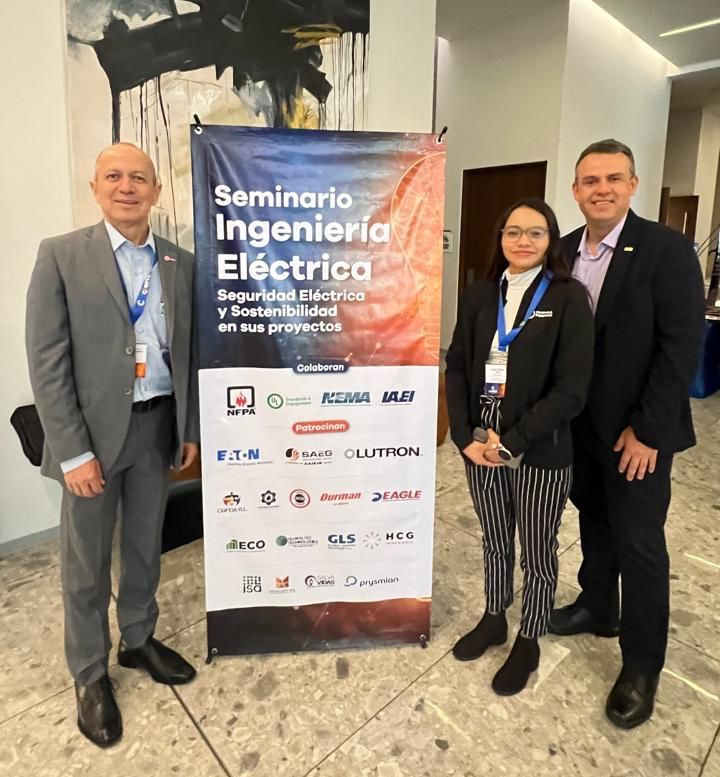
In June, we hosted an extensive sharing session on standards that could bolster the economy’s electric vehicle infrastructure, at the request of our partner, IBNORCA – Bolivia’s national standards body as it explores the adoption of several ULSE standards for EVs. Alex Krabbe, ULSE senior standards engineer, shared insights and data developed by ULSE on the trends and challenges of lithium-ion batteries for Bolivia and the LATAM region, and UL Solutions experts presented on the range of ULSE standards for EVs.
Fire Safety
ULSE has a rich, impactful legacy in the development of fire safety standards, dating back to publication of our very first standard – covering tin-clad fire doors – in 1903. We take great pride in our collaboration with our partners from UL Research Institutes and UL Solutions as well as ULSE’s expansive network of stakeholders to publish rigorous standards for a wide range of fire safety products and focus areas addressing the world’s most pressing challenges. Through research, standards development and advocacy, we believe in empowering communities with the knowledge and tools that can enable the effective prevention and management of fire hazards.
Normes de sécurité incendie
ULSE’s portfolio of standards for fire safety is among our largest, covering a variety of focus areas such as fire protection, firefighting, and resilience. The following highlighted standards have been leveraged to support the work of our global partners.
- UL 10A, Tin-clad Fire Doors
- UL 199, Automatic Sprinklers for Fire-Protection Service
- UL 217, Smoke Alarms
- UL 263, Fire Tests of Building Construction and Materials
- UL 268, Smoke Detectors for Fire Alarm Systems
- UL 448, Centrifugal Stationary Pumps for Fire-Protection Service
- UL 555, Fire Dampers
- UL 723, Test for Surface Burning Characteristics of Building Materials
- UL 1479, Fire Tests of Penetration Firestops
- UL 2079, Tests for Fire Resistance of Building Joint Systems
By Region
Learn more about our electrification efforts by region.
LATAM
Fire safety is a priority sector for ULSE’s work in Latin America. We aim to advance the region’s fire safety management efforts through hosting or co-hosting events and active participation in others hosted by our partners to facilitate knowledge sharing and drive impact. Among the key partners for these engagements are the Colombian Institute of Technical Standards and Certification (ICONTEC), National Association of Fire Protection of Colombia (ANRACI), and the National Fire Protection Association (NFPA).
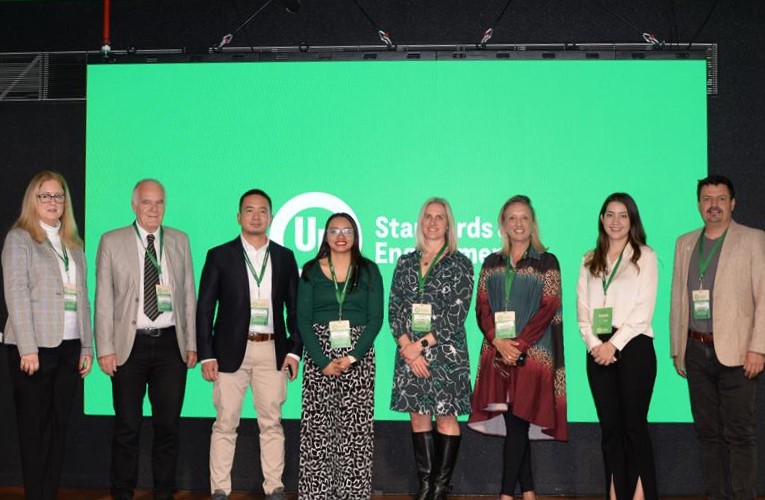
Over the past few years, we have built the LATAM Fire Safety Congress into a premier event, gathering experts to discuss and address current fire safety challenges affecting the region and to spur innovation in the sector. In 2024, the Congress was held in conjunction with esteemed partners such as ANRACI and the International Code Council (ICC). Highlights include ULSE Principal Engineer Wil Fletcher’s presentation on the unique firefighting challenges posed by electric vehicle fires and their impact on firefighter safety and response strategies. Also, ULSE Data Science Manager Ben Rodrawangpai presented data on the types of fire emergencies within some of the region’s economies.
In September, ULSE Director of Data Science and Engineering Dr. Denice Durrant and Data Scientist Leo Wei shared statistics on fires in the region and standards to mitigate fire risks in a fire safety webinar co-hosted with the Pan American Standards Commission (COPANT). Their presentations supported an objective to create a technical committee to focus on developing ULSE standards for the Americas which are regionally focused and able to be tailored for optimal local application.
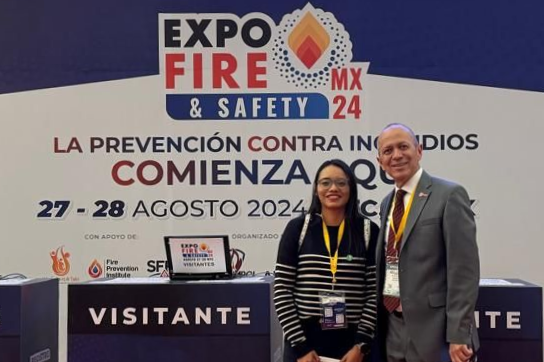
Other engagements included ULSE’s participation in fire expos for Peru and Mexico, and we hosted a webinar on fire dampers targeting the region’s stakeholders.
ANASE
Throughout the year, we developed working relationships with several new potential partners in the space, such as Vietnam’s Police Department of Fire & Rescue (PDFR) and its Ministry of Construction. ULSE facilitated discussions with local stakeholders to advance the exploration of international standards within domestic regulations. Another highlight of our fire safety efforts in Vietnam came in March when Regional Director Kolin Low met with leaders of the Vietnamese fire safety community on the emergent fire safety issues relating to electric vehicles.
In Indonesia, ULSE participated in a conference in Surabaya to commemorate the 105th anniversary of the nation’s firefighting service. Our team provided multiple presentations introducing attendees to the variety of ULSE standards for fire safety and firefighting.
Inde
Our partnership with several Indian fire safety entities led to our hosting meetings and training sessions for members of the local fire service. In August, we partnered with the Fire & Security Association of India (FSAI) to host a roundtable on passive fire protection for a select group of stakeholders seeking to improve resilience in the built environment to achieve safer outcomes. A parallel effort to the roundtable was the drafting of a white paper titled “Passive Fire Protection: An Imperative for Building a Safe Built Environment.” It presents strategies and case studies on codes and standards adoption and best practices for implementation to enhance the ability of India’s infrastructure to withstand emergencies.
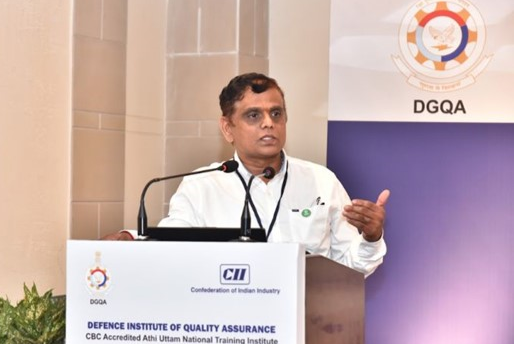
ULSE was also invited to participate in a training program for state fire officers that was organized by the Directorate General of Fire Service, Civil Defense and Home Guard. The program provided a practical understanding of mitigation strategies to extinguish fires involving electric vehicles. During this event, ULSE Vice President International Standards Sonya Bird spoke about the emerging challenges for fire safety professionals brought about by new technologies. Senior Regional Manager Manjunath V. presented overviews of ULSE standards for active fire protection and the UL enterprise’s research capabilities for EV fires.
Philippines
In September, ULSE jointly organized a conference in Manila with the Bureau of Philippine Standards to analyze a series of domestic fire incidents caused by substandard photovoltaic systems. Promoting Standards in Photovoltaic and Energy Storage System to Enhance Safety and Fire Protection featured presentations advancing awareness about ULSE standards for ESS and other battery safety topics to help address some of the root causes of the fires. Speakers included experts from UL Solutions, Singaporean ESS expert Dr. Lionel Moh, and representatives of Philippine industry and government – including Dr. Florigo Varona, the 2024 President of the Institute of Integrated Electrical Engineer (IIEE), and officials from the Bureau of Fire Protection and the Department of Energy, who spoke in support of renewable energy development in the country.
Other Events and Initiatives in ASEAN
We built upon existing relationships with additional national standards bodies in the region through hosting a variety of events, as well as participation in events hosted by these partners. This included multiple presentations in Indonesia by Regional Director Kolin Low about ULSE’s portfolio of standards for battery and fire safety, including at the International Battery Summit.
We were proud to co-host the first Thai Standards Forum with the Thai Industrial Standards Institute (TISI). The Forum explored various trends, issues, and regulatory gaps related to battery safety. ULSE Data Science Manager Ben Rodrawangpai joined Dr. Carl Wang and Winter Ho represented the UL enterprise as speakers. In his presentation, Rodrawangpai discussed lithium-ion battery safety along with the analytical and visualization methods ULSE uses to study these and other issues. Other presenters included professionals from the Electricity Generating Authority of Thailand and the Provincial Electricity Authority.
Two roundtables were organized on the Forum’s sidelines – one with TISI’s network of professionals involved in the Thai battery landscape, and another with the Thai Energy Storage Technology Association (TESTA) led by its president, Dr. Pimpa Limthongkul – to discuss battery safety issues and gaps and addressing solutions. Both roundtables provided insights into the opportunities for international standards to solve for gaps in existing guidelines and regulations.
LATAM
In June, we hosted an extensive sharing session on standards that could bolster the economy’s electric vehicle infrastructure, at the request of our partner, IBNORCA – Bolivia’s national standards body as it explores the adoption of several ULSE standards for EVs. Alex Krabbe, ULSE senior standards engineer, shared insights and data developed by ULSE on the trends and challenges of lithium-ion batteries for Bolivia and the LATAM region, and UL Solutions experts presented on the range of ULSE standards for EVs.
Circular Economy and Sustainability
Sustainability will shape our future in all aspects of life – at home, our communities, industry, and more. Many ULSE standards embed sustainability and environmentally responsible practices on top of safety. UL 3600, Measuring and Reporting Circular Economy Aspects of Products, Sites, and Organizations, is our pioneering standard for circularity. It provides a comprehensive framework for companies to evaluate their circular economy initiatives and quantify their sustainability performance at the site, product, or company levels. Since it was first published in 2023, UL 3600 has garnered significant interest from our international stakeholders seeking to assure trust in their circular economy efforts. In 2024, ULSE published the second edition of UL 3600.
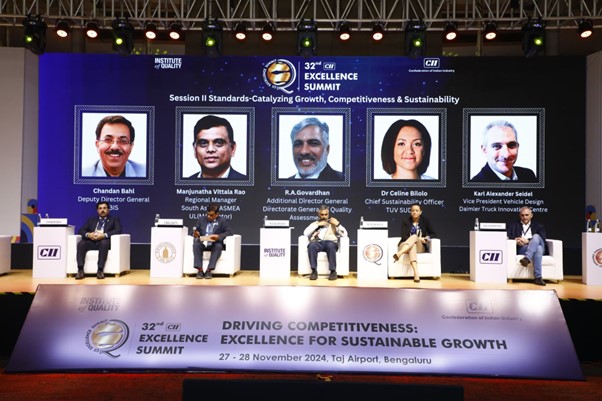
Significant progress was made during 2024 toward the publication of a new standard, UL 3601, Measuring and Reporting Circularity of Li-ion and Other Secondary Batteries. The rapid growth of the global battery economy is driving questions about the environmental impact of battery disposal upon reaching the end of their useful life. The standard is intended to provide a blueprint for circularity in the manufacturing and reuse of lithium-ion batteries, addressing aspects such as sourcing of raw materials, improved battery designs enabling easier disassembly and material recovery, establishment of efficient collection systems, and development of advanced recycling processes.
Standards and Other Documents for Circular Economy and Sustainability
ULSE launched its sustainability program team in 2023 in response to the demand and opportunities for standardization to advance both trust and innovation in green initiatives such as circularity and environmental impact. Our global partners leverage these standards and other documents to advance local circular economy initiatives.
- UL 110, Sustainability for Mobile Phones
- UL 2789, Environmental Claim Validation Procedure (ECVP) for Calculation of Estimated Recyclability Rate*
- UL 2799, ECVP for Zero Waste to Landfill*
- UL 2809-1, ECVP for Defined Source Content*
- UL 2809-2, ECVP for Recycled Content*
- UL 2809-3, ECVP for Ocean Plastics and Ocean Bound Plastics*
- UL 2809-4, ECVP for By-Product Synergy*
- UL 3420, Formulated Plastics Packaging
- UL 3600, Measuring and Reporting Circular Economy Aspects of Products, Sites and Organizations
- UL 3601, Measuring and Reporting Circularity of Li-ion and Other Secondary Batteries.
*ECVPs are alternative certification documents published by UL Solutions
By Region
Learn more about our circular economy and sustainability efforts by region.
International
ULSE was proud to present its standards for sustainability and circular economy on a global stage at COP29. Read more in the Global Events section of this report.
Inde
Indian stakeholders’ interest in international standards for circular economy has risen sharply as a means of supporting the country’s sustainability initiatives. During the year, we hosted two webinars to grow awareness in ULSE’s portfolio of sustainability standards to Indian professionals with presentations by experts from ULSE and UL Solutions. One of these focused on the circular economy for plastics and polymers, and the other was titled Zero Waste to Landfill and Lithium-ion Batteries.
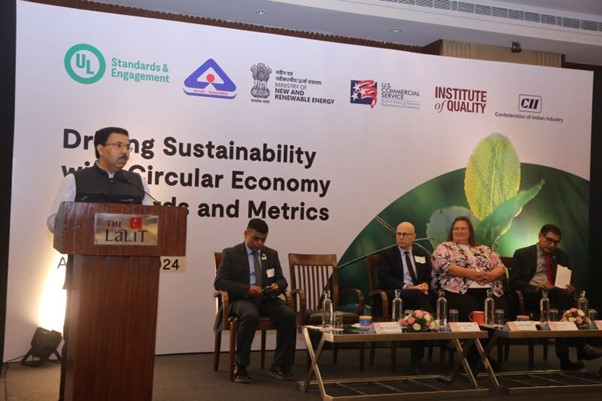
In August, a roundtable and workshop was held with government and industry stakeholders to drive adoption of standards for circular economy to help address India’s sustainability and waste management challenges. Held in partnership with the Ministry of New and Renewable Energy, Confederation of Indian Industry, participants discussed the implementation of circular economy models, advancements, measuring the effectiveness of circularity initiatives, and more. Stakeholders affirmed their commitment to shaping a more sustainable future for India.
One other outreach initiative involved Senior Regional Manager Manjunath V. participating in a seminar on sustainability in the air-conditioners sector. He delivered a presentation about the value-adds of standards and moderated a panel discussion organized by the World Research Institute on the data frameworks needed to drive battery circularity in India.
Wire, Cable and Electrical Products
Our portfolio features more than 40 consensus standards for wire and cable, and it continues to expand as we address emerging safety challenges brought about by new technologies. Key areas of focus in this portfolio include charging cables for portable electronics and connection cables for electric vehicle infrastructure. While some standards are designed for voluntary adoption, the majority are aligned with the requirements of the U.S. National Electrical Code (NEC) – the NFPA 70 – and are categorized based on their relevance to specific installation types within the Code.
Beyond the U.S., policy and regulatory stakeholders in various countries have adopted or referenced these standards within policy guidance or regulatory frameworks. We remain committed to continuing ongoing engagement with current and prospective international users – or anywhere there is interest. Notable examples of the year are as below.
By Region
Learn more about our wire, cable, and electrical product efforts by region.
Chine
Our China-based team hosted the first ULSE international standards forum for home appliances in May in partnership with the China Household Electrical Appliances Research Institute. Held in Hangzhou, the forum was a gathering of standards experts with deep knowledge of the different standards and regulatory requirements of trading household appliances across various markets. Participants took away knowledge of the key regulatory requirements to note when exporting products from China to the various markets represented and of interest – the U.S., the EU, India, Singapore, Thailand, Vietnam, Australia, and Japan. New requirements of Chinese national standards and updates to Chinese regulations were also presented. ULSE speakers at the event included Randi Myers, electrification program director; Amy Sim, ASEAN regional manager; and Richie Stephen, senior regional standards project manager.
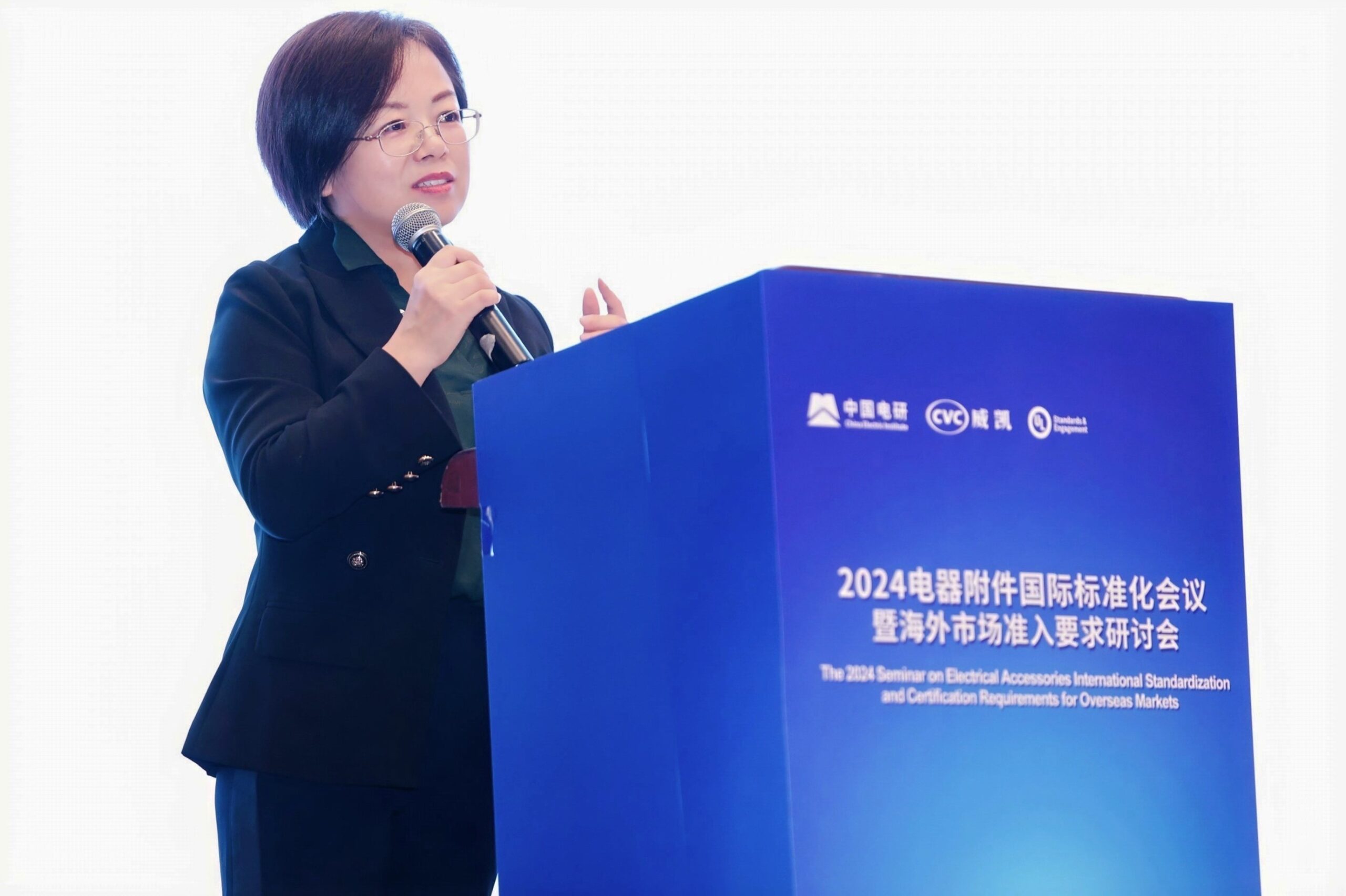
To build upon the success of the first international standards forum, the team hosted the second in September – this time on plugs and sockets – in Guangzhou. Attendees heard presentations by experts from UL Solutions about the technical requirements of relevant ULSE standards such as UL 498, Attachment Plugs and Receptacles, and UL 817, Cord Sets and Power-Supply Cords. Grace Roh, lead international standards project manager for ULSE, delivered a presentation about the work of IEC TC 72, covering automatic electrical controls, on which she serves as secretary. Lim Say Leong, representing our partner organization, Enterprise Singapore, presented on Singapore’s experience managing electrical safety gaps in plugs and sockets amidst a decades-long evolution in the standards landscape for these devices. On the sidelines of the forum, a roundtable was held to discuss the standards for plugs and sockets adopted in China and the ASEAN region. Participants discussed the various standards and regulatory requirements and opportunities to advance trade.
Through hosting these types of events, ULSE provides a platform for industry, government, and other stakeholders to share knowledge about the requirements of key standards and regulations of different countries to foster international trading of goods meetings safety standards.
Philippines
Driven by interest in adopting a ULSE standard to cover parols, an ornamental lantern traditionally used as part of Filipino celebrations of Christmas, ULSE jointly organized a conference with the Bureau of Philippine Standards (BPS) in March 2024. The event was held in San Fernando City, considered the country’s ‘Christmas capital’ because it’s where most Parol makers are from, to discuss UL 588, Seasonal and Holiday Decorative Products. Attendees included Department of Trade and Industry Regional Director Brigida T. Pili and BPS Director Neil Catajay. U.S. Consumer Product Safety Commission (CPSC) officials presented the commission’s current regulatory frameworks for decorative lighting products, which references UL 588, and Neo Hsiao, engineering manager for UL Solutions, presented on the standard’s technical and supply chain requirements and about its ongoing development.
As another highlight was our formation of the first ULSE National Mirror Committee (NMC) with BPS to optimize Philippine stakeholders’ participation in ULSE TC 62, Flexible Cords and Portable Power Cables, and TC 588, Seasonal Holiday Decorative Products. Two workshops were organized with the NMC members and other stakeholders to build familiarity with the ULSE standards development process, and how to get the most out of their participation.
India and LATAM
Our teams in India and Latin America participated in a variety of engagements about household electrical products. Highlights include a panel discussion on standards for variable refrigerant flow (VRF) air conditioners moderated by Manjunath V. at a summit hosted by the Indian Society of Heating, Refrigerating and Air Conditioning Engineers (ISHRAE) and the Refrigeration & Air-Conditioning Trades Association (RATA); and an electrical engineering seminar in Costa Rica hosted in collaboration with the College of Electrical, Mechanical and Industrial Engineers (CIEMI). At the latter event, ULSE’s Diana Rico presented about the importance of standards to advance safe innovation in electrical engineering.
Global Impact Case Studies
ULSE at COP29
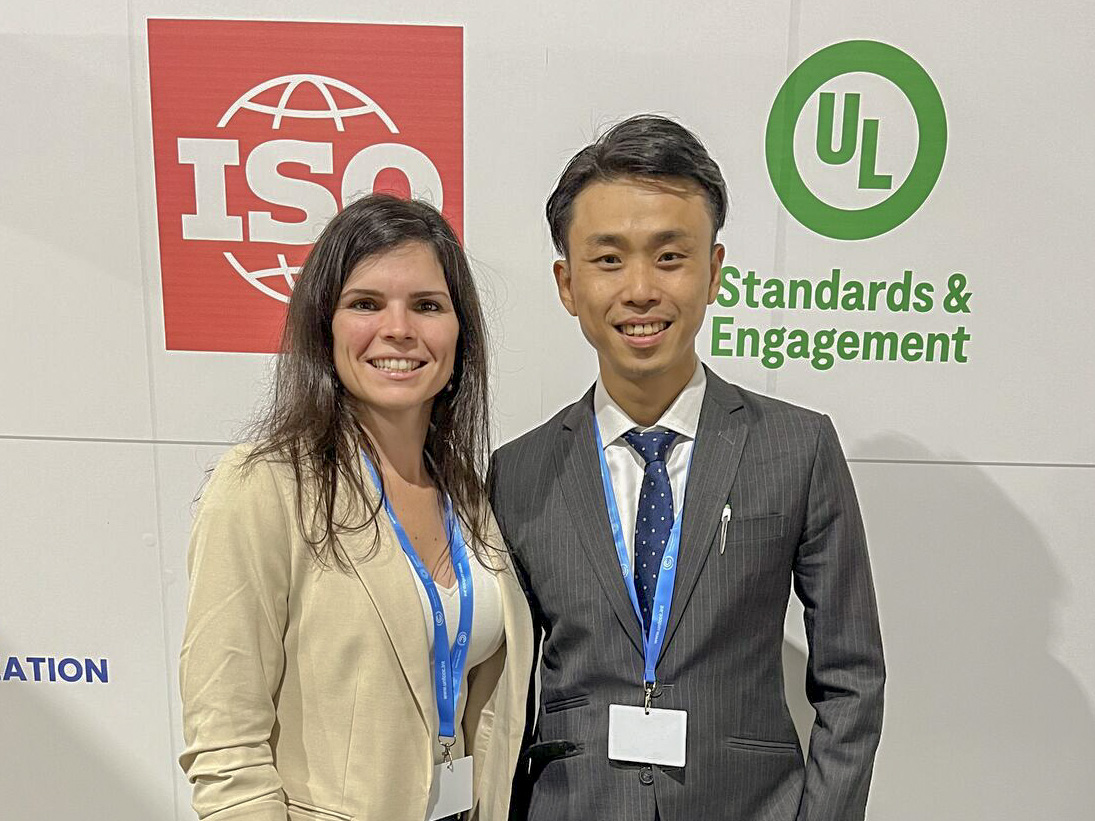
Standards can help support local, regional, and global initiatives to advance sustainability and address the effects of climate change. That was the message delivered through the first-ever Standards Pavilion at COP29. The Pavilion, co-led by ULSE, IEC, and ISO with support from additional partners, was hosted at the UN’s annual flagship inter-governmental and international conference on climate change. The event, held in Baku, Azerbaijan, was an opportunity for ULSE to showcase our work in sustainability and climate resilience on a global stage and drive forward our working relationship with IEC and ISO while also initiating new partnerships. Advancing the UL mission at COP29 was greatly enabled through the participation of our colleagues from UL Research Institutes and UL Solutions who shared expertise and initiated meaningful conversations with partners and pavilion visitors.
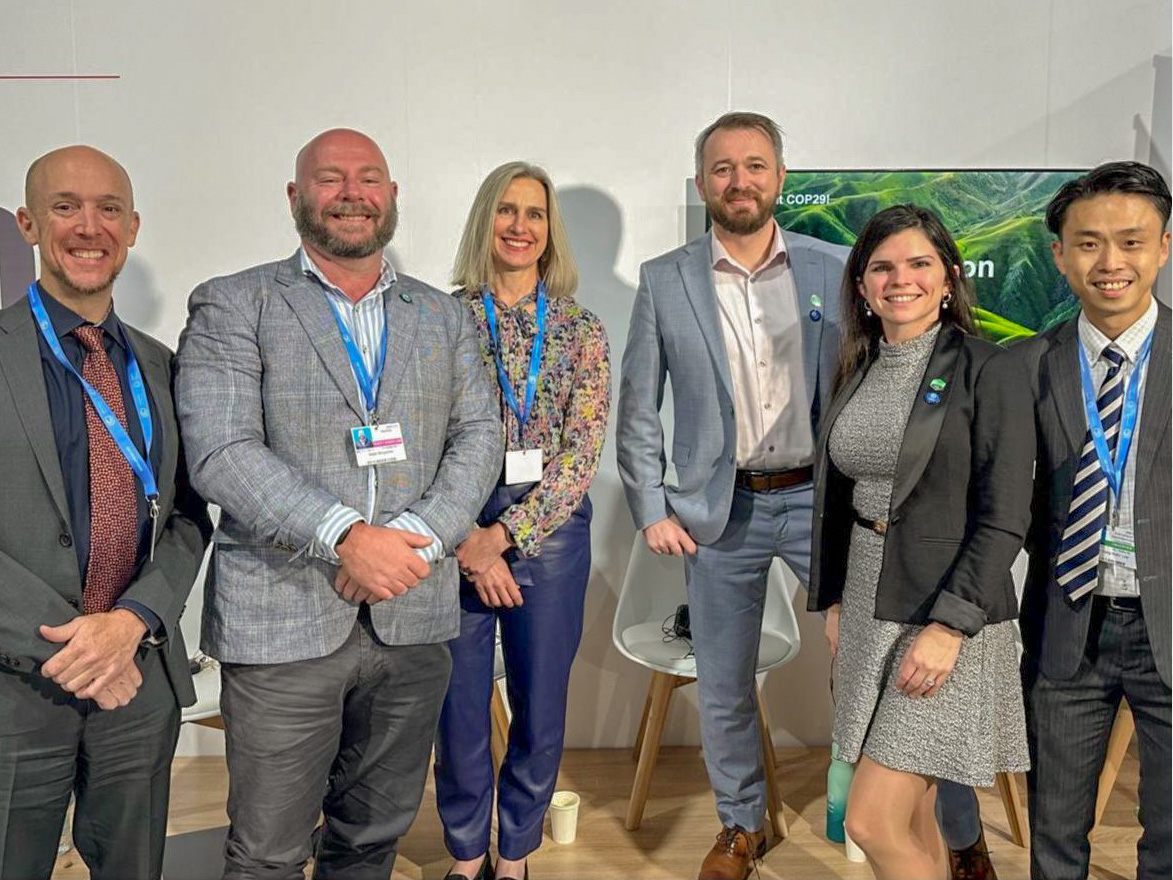
Regional Director Kolin Low and Senior Standards Program Manager for Sustainability Caitlin D’Onofrio represented ULSE at COP29 through presentations and participating in panel discussions. Topics covered included a general overview of standardization to benefit visitors to the Standards Pavilion, and promote sustainable, global development of the solar value chain, challenges affecting the development of battery circularity – and how standards could help, and how regulatory frameworks and financial support for clean energy projects can benefit from standardization. In a panel discussion which included D’Onofrio, Dr. Stuart Miller from ULRI’s Materials Discovery team, and UL Solutions’ Rick Ziegler teamed up to discuss improving resiliency for homes, buildings, and systems – such as the energy grid – as a means of mitigating the impact of increases in the number and severity of catastrophic severe weather events and wildfires around the world.
Participation at COP 29 brought ULSE’s work to position standards as an effective tool for global climate action and safety to a diverse set of new audiences. Co-leading the Standards Pavilion with IEC and ISO advanced and expanded our working relationship with these organizations while signifying our position in and commitment to international standardization and sustainability.
International Standardization
Although ULSE publishes national standards for the United States, Canada, and Mexico, our work and impact extend throughout much more of the world. In line with the UL mission – working for a safer world – we are committed to partnering with SDOs, government, and other bodies to advance safety, security, and sustainability through standardization. Together with our partners, we share technical information, support one another’s standards development work, and foster global trade through harmonization.
Activity Highlights
Learn more about our international standardization efforts.
IEC and ISO
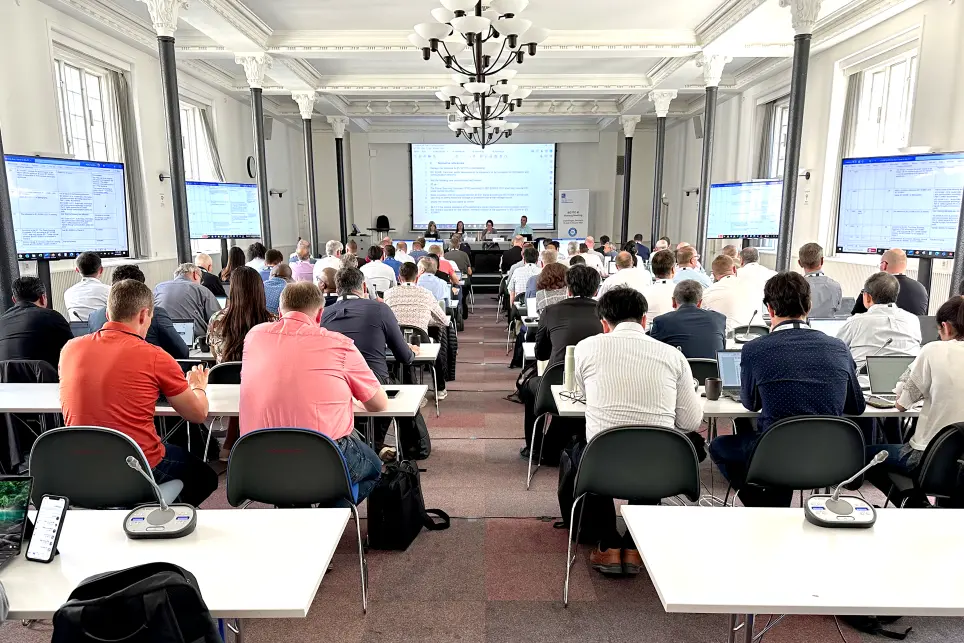
ULSE contributes directly to the development of IEC and ISO standards by submitting UL standards, either in full or in part, as proposals that help shape international standards—particularly in emerging technology areas. Our involvement positions us at the forefront of setting benchmarks for the next wave of technological advancements. As of the end of 2024, UL standards’ content—including texts, tables, and figures—has been incorporated into more the provisions of more than 20 IEC standards and 4 ISO standards.
ULSE staff members Randi Myers, Valara Davis, Grace Roh, and Brooke Martens support IEC through serving as secretaries on various technical committees. These include IEC TC 61 (Safety of Household and Similar Electrical Appliances), IEC TC 72 (Automated Electrical Controls), and IEC TC 108 (Safety of Electronic Equipment within the Field of Audio/Video, Information Technology, and Communication Technology).
We are also engaged in the activities of ISO; as an example, Valara Davis serves as the Committee Manager for ISO TC 92 / SC 2 (Fire Resistance).
As part of our service to these technical committees, it was our honor to host some of their meetings. In April 2024, ULSE hosted an ISO TC 92 / SC2 meeting at our office in Research Triangle Park, North Carolina, and in November 2024, we hosted a meeting of IEC TC 61 at our Evanston, Illinois headquarters.
IEC General Meeting
ULSE proudly sponsored the 2024 IEC General Meeting held in Edinburgh, hosted by the British Standards Institution (BSI). Leveraging the event’s convening of one of the largest global standards communities, we provided presentations on our standardization work and to build and strengthen partnerships.
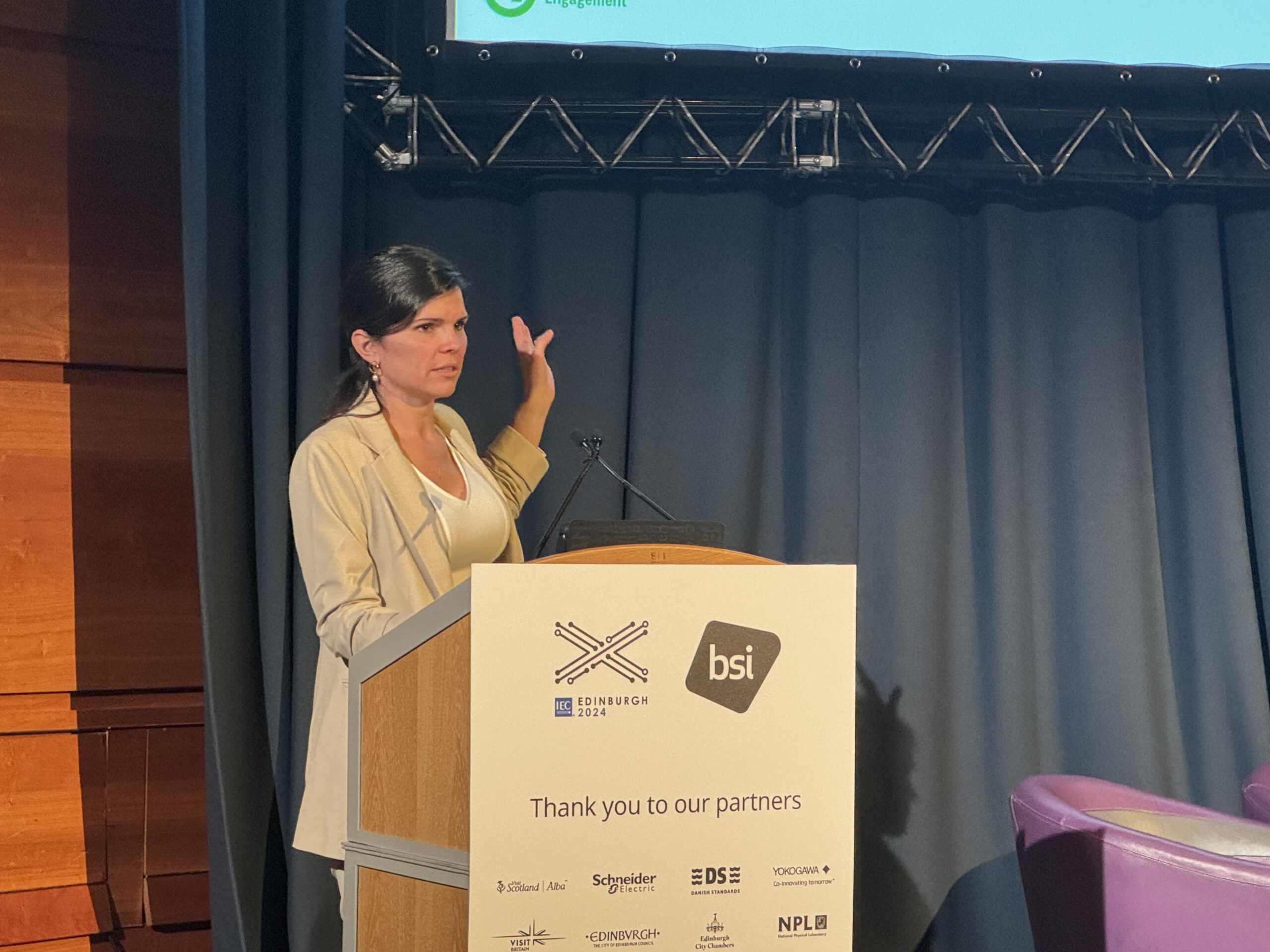
Caitlin D’Onofrio presented on the ULSE’s portfolio of sustainability standards during the BSI Smart Cities Showcase Day and contributed to its panel discussion on the value of sustainability standards in the growth of smart cities.
ULSE – led by Board Chair James M. Shannon and Sonya Bird – hosted a welcome reception attended by approximately 100 partners and stakeholders to celebrate past, current and future collaboration. We also co-hosted the Women in IEC Afternoon Tea. The latter event celebrated both the achievements and growing participation by women in standardization and greater recognition of the importance of gender-responsiveness in standards requirements.
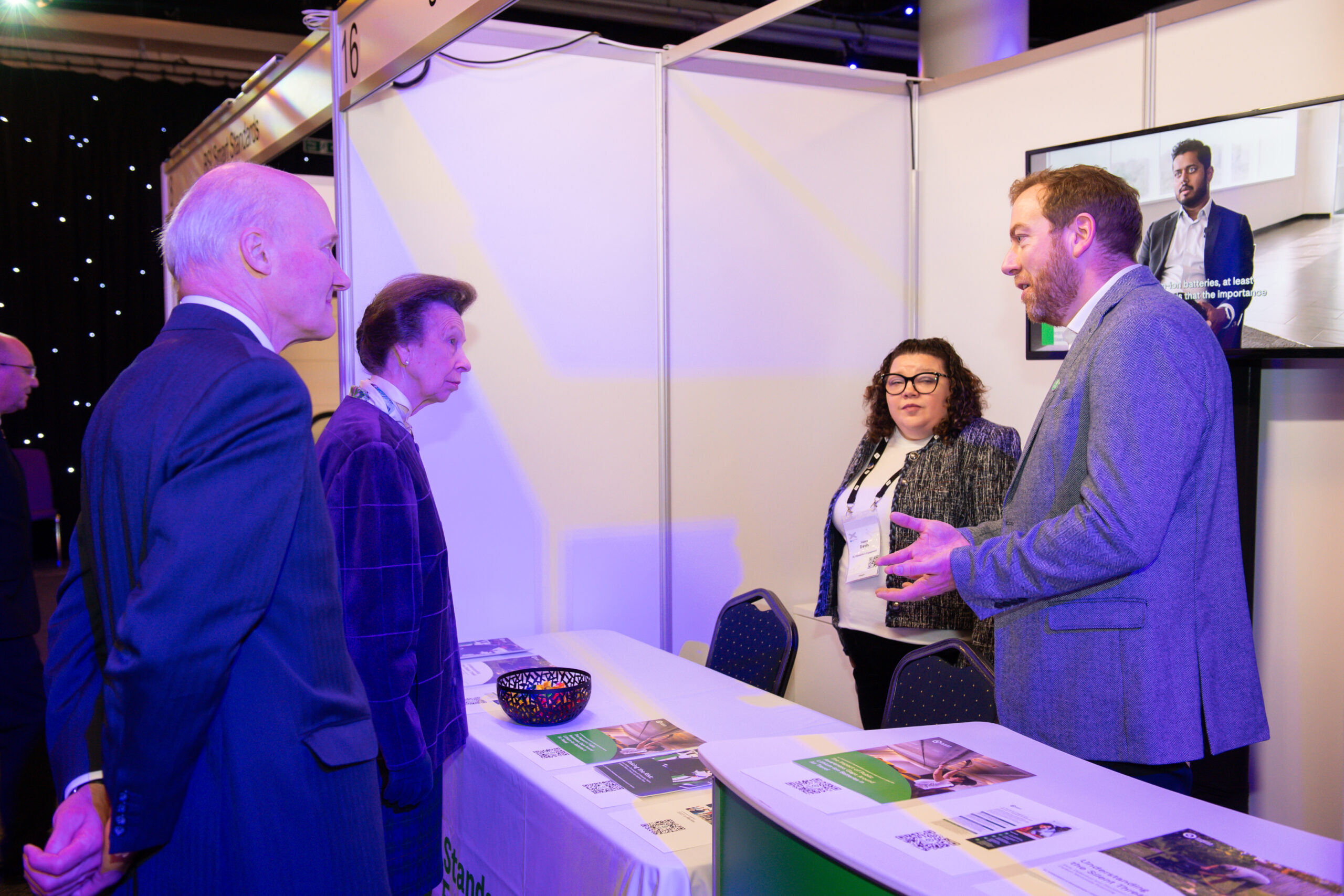
Additionally, ULSE hosted a booth in the expo area, at which we showcased our organization and examples of our work. We were honored by a visit from Anne, the Princess Royal, who visited the General Meeting to address IEC delegates.
Global
Our teams in India and Latin America participated in a variety of engagements about household electrical products. Highlights include a panel discussion on standards for variable refrigerant flow (VRF) air conditioners moderated by Manjunath V. at a summit hosted by the Indian Society of Heating, Refrigerating and Air Conditioning Engineers (ISWe continue to look for opportunities to engage on regional standardization platforms where we can add value through supporting harmonization, coordination, and economic opportunity through international trade.
CANENA: This regional organization focuses on electrotechnical standards harmonization activities across North and South America. International Standards Manager Valara Davis serves on the CANENA Executive Committee as the U.S. standards development organization representative. She presented at the 2024 CANENA General Meeting on opportunities for Latin American SDOs to participate in CANENA’s harmonization process, as well as regional collaboration between CANENA and IEC – a key focus of a new CANENA strategic task force.
COPANT: Serving as the forum of North and South American national standards bodies (NSBs) and other SDOs, this organization fosters alignment on regional priorities, the sharing best practices, and work to address standardization challenges. COPANT provides important opportunities to ULSE to build and maintain relationships with other member organizations, and to develop or translate ULSE standards addressing regional needs.
Asia Pacific Economic Cooperation (APEC): ULSE’s involvement with provides opportunities to grow awareness of regionally relevant standards, such as when Regional Director Kolin Low participated in an APEC webinar to present about our standards for electric road passenger vehicle supply equipment.
US-ASEAN Business Council (USABC): Low was appointed vice chair of the ASEAN Committee and chair of the Standards Subcommittee for USABC, succeeding ULSE’s Phil Piqueira upon his retirement. ULSE has held these roles since their initiation in 2020. The committees will continue their work with the ASEAN Consultative Committee on Standards and Quality (ACCSQ), focusing on areas such as electric vehicles and cybersecurity to support regional standards harmonization efforts and technical exchanges.
New UL Standards
UL 2272: Electrical Systems for Personal E-Mobility Devices, Edition 2

ULSE published the second edition of UL 2272 in April. To demonstrate significance of the new edition, several jurisdictions have adopted the standard or referenced it in national regulations.
Updates in the second edition include new requirements for gaskets and seals, clarification of flammability requirements for nonmetallic materials, updated marking requirements, and updates to certain tests.
We organized two global webinars, as well as specific closed-door virtual workshops to educate participants about the updates in the new edition from the first edition and the continued need for the standard to remain relevant. The new edition remains a top case study of ULSE standards adopted within international jurisdictions.
Highlighted New and Revised Standards
These highlights illustrate the breadth of our ongoing standards development activities and are not an exhaustive list of all updates.
- UL 4740, Standard for Safety for LiDAR and LiDAR Systems
- UL 970, Retail Fixtures and Merchandise Displays
- UL 1395, Transients Test Method
- UL 1008M, Transfer Switch Equipment, Meter-Mounted
- UL 1976, Crimp Tools for Use with Connecting Devices
- UL 6288, Decorative Lighting Cords
- UL 62990-2, Workplace Atmospheres – Part 2: Gas Detectors – Selection, Installation, Use and Maintenance of Detectors for Toxic Gases and Vapours
- UL 1424, Cables for Power-Limited Fire-Alarm Circuits
- UL 1479, Fire Tests of Penetration Firestops
- UL 1682, Plugs, Receptacles, and Cable Connectors of the Pin and Sleeve Type
- UL 1741, Inverters, Converters, Controllers and Interconnection System Equipment for Use With Distributed Energy Resources
- UL 2079, Tests for Fire Resistance of Building Joint Systems
- UL 920004, Performance Requirements for Open Path Toxic Gas Detectors
- UL 3600, Standard for Sustainability for Measuring and Reporting Circular Economy Aspects of Products, Sites and Organizations
- UL 3300, Service, Communication, Information, Education and Entertainment Robots
- UL 4248 Series, Fuseholders
- UL 8139, Electrical Systems of Electronic Cigarettes and Vaping Devices
- UL 8752, Organic Light Emitting Diode (OLED) Panels
- UL 9990, Information and Communication Technology (ICT) Power Cables